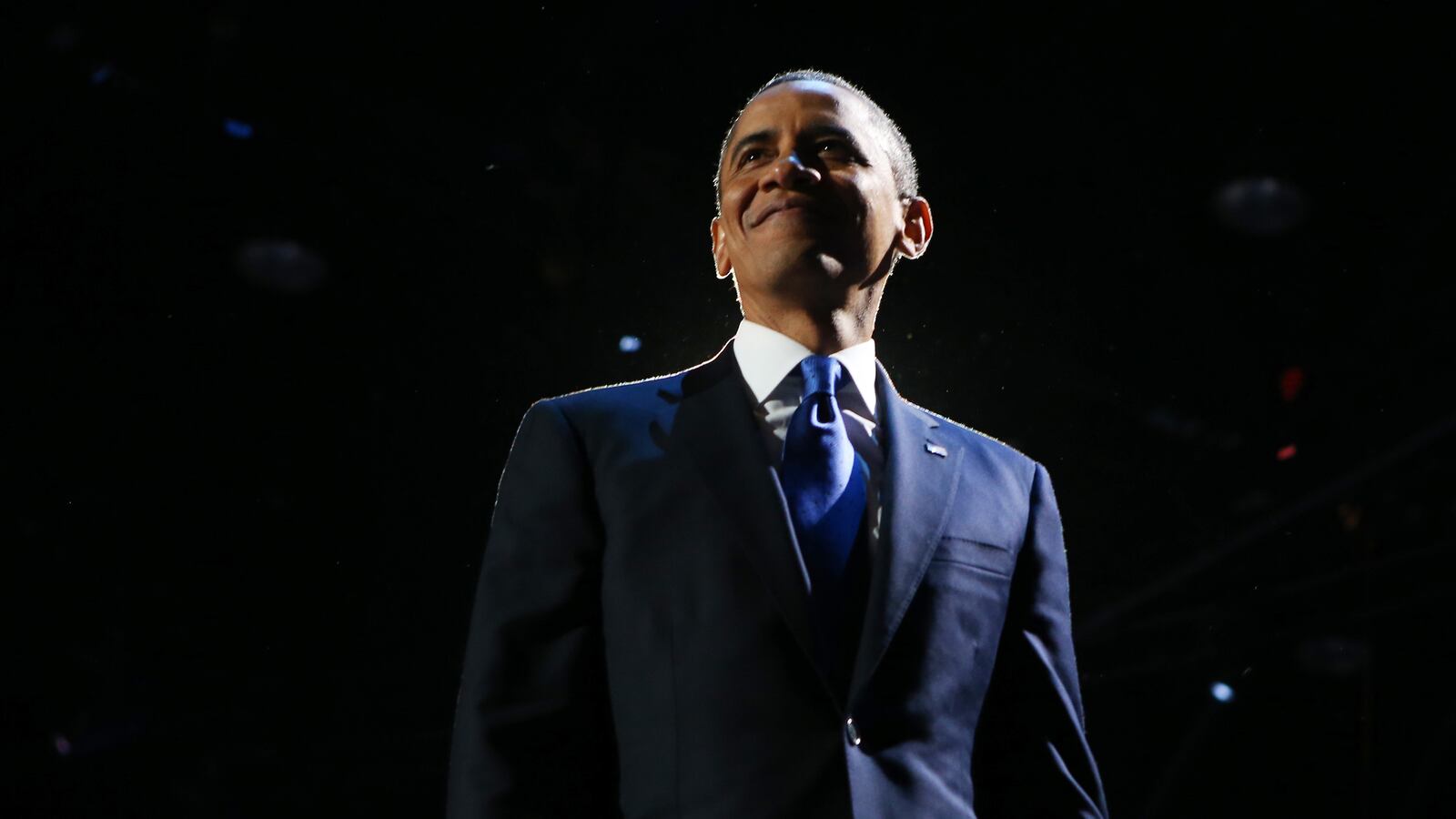Most of the country had gone to sleep, but President Obama was hitting the rhetorical heights for a cheering Chicago crowd shortly before 2 a.m. Wednesday, calling for “a generous America,” “a compassionate America,” “a tolerant America.”

He offered an ambitious laundry list as well: “Reducing our deficit. Reforming our tax code. Fixing our immigration system. Freeing ourselves from foreign oil.”
But despite some conciliatory words from John Boehner later in the day, Obama’s sweeping victory doesn’t change a fundamental fact: this turned out to be a status-quo election. The president still has to deal with dogged House Republicans, and it’s not clear his reelection gives him a whole lot more clout to impose his will.
“His personal attributes helped him to beat Mitt Romney but didn’t sell his policies to the American people,” says Terry Holt, who worked in George W. Bush’s campaigns. “At the end of the day, this campaign didn’t have much substance to it at all.”
Still, 303 electoral votes ain’t chicken feed, and both sides have to observe a certain decorum after a hard-fought campaign. When Boehner went before the television cameras Wednesday, he made a point of saying his message was “not one of confrontation … Mr. President, this is your moment. We’re ready to be led,” the House speaker said.
But leading the Republicans who have battled Obama for four years is not so easily done, and the president has the scars to show it.
Some analysts see an opening in the wake of a solid reelection victory. “The president has new negotiating leverage,” says Thomas Mann, a congressional scholar at the Brookings Institution. “He has a group of Republican senators who aren’t willing to spend four more years being whipped by Mitch McConnell into unified opposition. The Republicans need something affirmative. Just saying no or stopping things is not sufficient.”
That is the fervent hope of White House officials as they turn their attention to the year-end deadline known as the fiscal cliff. Obama has said he believes his reelection would “break the fever” that has paralyzed Washington and move the GOP toward a more cooperative stance, knowing he’ll be in power another four years.
As an additional incentive, says Mann, “Republicans are terrified about demographic trends and the possibility of being marginalized over the long haul.” Obama, for instance, won 71 percent of the Hispanic vote, according to exit polls.

At a practical level, Obama has won at least grudging respect from an opposition party that once believed he’d be easy to defeat. “He certainly has some political momentum,” says a former House GOP official. “I don’t believe that involves a mandate to go out and raise taxes in America. I still don’t think Republicans are going to agree to tax increases, but is there an ability to work on tax reform and broaden the base? Absolutely.”
Boehner suggested as much Wednesday in addressing the tax question that, in a pitched battle last year, nearly plunged the country into default. “Republicans are willing to accept new revenue if it comes from growth and reform,” he said. Obama and Boehner had agreed on a $4 trillion “grand bargain” of spending cuts and tax increases, which fell apart amid accusations of bad faith and objections from the base of both parties.
Obama could be emboldened by the timing of the fiscal-cliff showdown. If Congress does nothing, the Bush tax cuts expire and draconian spending cuts automatically take place in domestic and defense programs. The president could let that happen and then try to dictate a deal.
If history is any guide, Obama has about a year to notch major accomplishments before midterm politics—and the shadow of lame-duck status—undermine his effectiveness. But it is equally true that by failing to lay out a detailed agenda in 2012, Obama forfeited his ability to claim a specific mandate.
When Bush won a close election in 2004, he said he planned to spend his political “capital”—and pushed a Social Security privatization scheme he had never proposed in the campaign. It quickly went down in flames.
Obama’s best hope is that he can hammer out compromises on issues that would yield political dividends for both sides. Mann says the president could make progress on immigration, energy, and education. But it would be hard to argue, given the vagueness of his campaign, that he won a specific mandate.
But opposition to Obama is a well-developed reflex for many Republicans who have demonized him, and a mere reelection victory may not soften their views.
“His election in 2012 was less decisive, and I think he comes back to the table with even less influence than he had when he was elected in 2008,” Holt says. “His first election was about hope and change and being part of the solution. This campaign was about division, us-versus-them, and that tends to weaken one’s hand, not strengthen it.”





